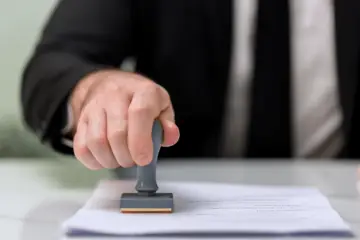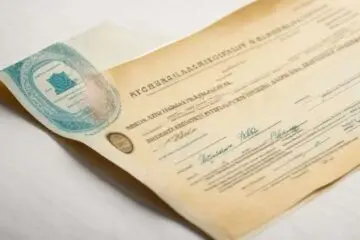When dealing with international legal documents, one of the most important steps is ensuring their authenticity. Many foreign governments require an apostille to verify the validity of U.S.-issued documents before they are accepted abroad. Whether applying for a visa, work permit, dual citizenship, marriage registration, or business transactions, obtaining an apostille ensures legal recognition in another country.
Understanding what an apostille is, how it works, and the step-by-step process helps avoid delays and ensures compliance with international legal requirements.
What Is an Apostille?
An apostille is a specialized authentication certificate issued by a government authority to verify the legitimacy of a public document. It confirms that the document is genuine and has been issued by a recognized authority.
Apostilles are issued under the Hague Apostille Convention of 1961, an international treaty signed by over 120 countries to simplify the process of document authentication for use across borders. If a document has an apostille, it does not require additional embassy or consular legalization.
For non-Hague Convention countries, a document must go through a more complex legalization process, involving multiple verification steps, including authentication by the U.S. Department of State and the foreign embassy.
Why Do You Need an Apostille?
If you need to use a legal document in a foreign country, you will likely need an apostille to prove its authenticity. Without an apostille, the receiving country may reject the document or require additional legalization steps, delaying your application process.
Apostille certification is essential for various legal, personal, and business matters, such as:
- Visa and residency applications requiring notarized documents, such as birth or marriage certificates.
- International marriage registrations, where a foreign government requires proof of previous marital status.
- Adoption procedures, ensuring documents related to international adoption are legally recognized.
- Business transactions and corporate documents, including company registration, tax forms, and contracts.
- Educational certifications, such as university diplomas and transcripts required for study or employment abroad.
- Criminal background checks, such as FBI background checks, are needed for work permits and immigration applications.
Each country has specific apostille requirements, so verifying which documents require an apostille before submission is essential.
Which Documents Require Apostille Certification?
Several categories of documents require apostille authentication before they can be legally used in another country. These include:
Personal Documents:
- Birth, marriage, and death certificates
- Divorce decrees
- Adoption records
- Power of attorney documents
- Wills and probate documents
Educational Documents:
- High school and university diplomas
- Academic transcripts
- Teaching credentials and certifications
Business and Corporate Documents:
- Certificates of incorporation
- Articles of organization
- Tax forms and compliance records
- Business contracts
Legal and Government-Issued Documents:
- Court orders
- Criminal background checks (such as FBI background checks)
- Notarized affidavits
- Immigration records
Different countries may have additional authentication requirements, so it is best to confirm the specific document requirements with the receiving country’s authorities.
How to Obtain an Apostille for International Legal Documents
Obtaining an apostille involves several steps, depending on whether the document is a state-issued document or a federal document. The process must be followed carefully to avoid rejection or delays.
Step 1: Obtain a Certified Copy of the Document
Before submitting a document for an apostille, it must be an official, certified copy issued by the relevant authority. For example:
- Birth and marriage certificates must be obtained from the state vital records office.
- Educational diplomas must be certified by the issuing school or university.
- Business documents must be certified by the Secretary of State’s office.
If a document is not originally certified, a notarized copy may be required before proceeding with the apostille request.
Step 2: Identify the Correct Apostille Authority
The authority responsible for issuing an apostille depends on the type of document:
- State-Issued Documents: If a document was issued by a state agency, such as birth and marriage certificates, the apostille is provided by the Secretary of State’s office in the state where the document was issued.
- Federal Documents: If a document is a federal document, such as an FBI background check, the apostille is issued by the U.S. Department of State Office of Authentications in Washington, D.C.
It is important to send documents to the correct office to avoid delays.
Step 3: Submit the Apostille Request
After identifying the correct apostille authority, the document must be submitted with a completed Apostille Request Form and the appropriate processing fee.
- Some state agencies allow online submissions, while others require requests to be sent by mail or in person.
- The U.S. Department of State accepts apostille requests for federal documents via mail.
Step 4: Processing and Receiving the Apostille
Processing times vary based on the issuing authority and method of submission. Standard processing times for state-issued apostilles range from 5 to 15 business days, while federal apostilles can take several weeks.
Expedited processing services are available through third-party apostille services, which help speed up the process for urgent applications.
Apostille vs. Embassy Legalization: What’s the Difference?
Apostilles are only accepted by countries that are members of the Hague Apostille Convention. If a country is not part of the Hague Convention, additional embassy or consular legalization is required.
Apostille (Hague Convention Countries)
- Only one step: obtaining an apostille from the appropriate Secretary of State or U.S. Department of State.
- No further authentication is needed.
- Faster processing and lower cost.
Embassy or Consular Legalization (Non-Hague Countries)
- Multiple steps required: Documents must be authenticated by the U.S. Department of State and then legalized by the embassy or consulate of the destination country.
- Additional fees, processing time, and translation requirements may apply.
Verifying whether your destination country accepts apostilles or requires embassy legalization is essential to prevent delays.
How to Avoid Common Mistakes When Requesting an Apostille
One of the most common mistakes is submitting incorrect or uncertified documents. Only official documents issued by recognized agencies can receive an apostille.
Another common issue is applying to the wrong authority. If a document is state-issued, it must be apostilled by the state’s Secretary of State. Federal documents must be apostilled by the U.S. Department of State.
Some countries require official translations of apostilled documents. If necessary, a certified translator must translate the document before submission.
Final Steps Before Using Apostilled Documents Internationally
After receiving an apostille, verify the document’s acceptance by the foreign institution or government agency. Some immigration offices and embassies require documents to be issued within a specific timeframe, such as three to six months before submission.
Keeping multiple copies ensures that you have backup documents in case of loss or additional legal requirements.
Frequently Asked Questions About Apostille Services for International Use
What is an apostille and why is it needed for international documents?
An apostille is a form of authentication issued for documents intended for use in countries that are part of the Hague Apostille Convention. It verifies the legitimacy of the notary or public official’s signature. If you’re unsure whether your destination country requires one, our apostille service page explains the process in more detail.
Which types of documents typically require an apostille?
Common documents that need apostilles for international use include birth certificates, marriage licenses, diplomas, corporate documents, and powers of attorney. We can also help with notarized statements and legal affidavits.
Can I get an apostille for a document issued in another state?
Yes, but the apostille must be issued by the Secretary of State where the document originated. We can assist with coordinating apostille processing in all 50 U.S. states—visit our apostille guide to learn more.
How long does the apostille process take?
Standard processing through the California Secretary of State usually takes 3-5 business days, but expedited options are available. Processing through the US Department of State usually takes 7-9 business days. For urgent needs, call us at (310) 526-0200 to discuss faster turnaround times.
Do apostille requirements vary by country?
Yes. Countries outside the Hague Apostille Convention may require embassy legalization instead. You can find a list of countries that accept apostilles on our main apostille page.
Can you notarize and apostille the document in the same visit?
Absolutely. We’re a one-stop shop. Our notary public services ensure your document is notarized correctly before we submit it for apostille processing. This simplifies the process and prevents delays.
Conclusion
Apostille services simplify the process of authenticating international legal documents, making them legally valid in foreign countries. Whether for visa applications, marriage registration, business transactions, or educational purposes, obtaining an apostille ensures your documents are properly recognized.
By following the correct submission process, verifying country requirements, and applying early, individuals and businesses can avoid delays and legal complications when using documents internationally.




0 Comments